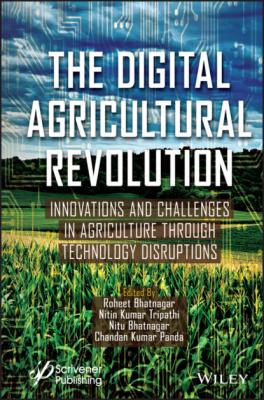ТОП просматриваемых книг сайта:
The Digital Agricultural Revolution. Группа авторов
Читать онлайн.Название The Digital Agricultural Revolution
Год выпуска 0
isbn 9781119823445
Автор произведения Группа авторов
Жанр Программы
Издательство John Wiley & Sons Limited
– Chapter 20 discusses the use of machine learning algorithms to study soil fertility, salinity, dynamics, and the relationship of soil organic carbon with the environment, spatial and temporal variation of soil water content, soil and water pollution, soil formation processes, soil classification, prediction, nutrient availability, etc.
Our intent in writing this book was to provide a foundation of comprehensive knowledge for others to build on; therefore, it is our sincerest hope that it will prove to be beneficial to people from different domains. We hope that you find it useful and engaging as you continue your journey to expand the sphere of human knowledge, if only by an inch.
We are thankful to all the authors and co-authors of every chapter who have contributed their knowledge in the form of quality manuscripts for the benefit of others.
The editorsDr. Roheet BhatnagarDr. Nitin Kumar TripathiDr. Chandan Kumar PandaDr. Nitu Bhatnagar April 2022
1
Scope and Recent Trends of Artificial Intelligence in Indian Agriculture
X. Anitha Mary1, Vladimir Popov2,3, Kumudha Raimond4, I. Johnson5 and S. J. Vijay6*
1Department of Robotics Engineering, Karunya Institute of Technology and Sciences, Coimbatore, Tamil Nadu, India
2Additive Manufacturing, Technion-Israel Institute of Technology, Haifa, Israel
3Ural Federal University, Ekaterinburg, Russia
4Department of Computer Science and Engineering, Karunya Institute of Technology and Sciences, Coimbatore, Tamil Nadu, India
5Department of Plant Pathology, TamilNadu Agricultural University, Coimbatore, India
6Department of Mechanical Engineering, Karunya Institute of Technology and Sciences, Coimbatore, Tamil Nadu, India
Abstract
Agriculture is the economic backbone of India. About 6.4% of the total world’s economy relies on agriculture [1]. Automation in agriculture is the emerging sector as there is an increase in food demand and employment. The traditional ways used by farmers are not sufficient to fulfill the demands and it is high time that newer technologies are implementing in the agricultural sector. Artificial Intelligence (AI) is one of the emerging and promising technologies where intelligence refers to developing and utilizing human-level thinking machines through learning algorithms programmed to solve critical problems. Artificial Intelligence plays an important role in supporting agriculture sectors with the objectives of boosting productivity, efficiency, and farmers’ income. This chapter focuses on how AI helps in increasing the socioeconomic and environmental sustainability in the Indian agricultural sector. Also, it highlights the AI practices in India incorporated by farmers having small and medium-size agricultural lands.
Keywords: Indian agriculture, Artificial Intelligence, farmers
1.1 Introduction
Artificial Intelligence (AI) is a broad field of computer science that focuses on creating intelligent machines that can accomplish activities that would normally need human intelligence. Although AI is a multidisciplinary field with many methodologies, advances in machine learning (ML) and deep learning (DL) [4] are causing a paradigm shift in nearly every sector of the IT industry.
One of the oldest occupations in the world is farming and agriculture. It has a significant impact on the economy. Climate variations also play an influence in the agriculture lifecycle. Climate change is a result of increasing deforestation and pollution, making it difficult for farmers to make judgments about which crop to harvest. Nutrient insufficiency can also cause crops to be of poor quality [37]. Weed control has a significant impact and can lead to greater production costs. The above traditional farming can be replaced by using modern technology with AI.
1.2 Different Forms of AI
Agriculture is extremely important, and it is the primary source of income for almost 58% of India’s population [2]. However, it lacks support and suffers from a variety of factors, such as groundwater depletion, erratic monsoons, droughts, plant diseases, and so on. To detect the relationship between influencing factors with crop yield and quality, a variety of tools and approaches have been identified. The impact of recent technological advancements in the field of AI is significant. Recently, large investors have begun to capitalize on the promise of these technologies for the benefit of Indian agriculture. Smart farming and precision agriculture (PA) are ground-breaking science and technological applications for agriculture growth. Farmers and other agricultural decision makers are increasingly using AI-based modeling as a decision tool to increase production efficiency.
Artificial Intelligence is silently entering Indian agriculture and impacting society to a greater extent. There are three forms of AI, namely Artificial Narrow Intelligence (ANI), Artificial General Intelligence (AGI), and Artificial Super Intelligence (ASI) [3] as shown in Figure 1.1 Artificial Narrow Intelligence as the name suggests uses computer programming to do a specific task. Artificial General Intelligence refers to a machine that can think like a human and perform huge tasks. Artificial Super Intelligence is designed to think beyond humans. Artificial Narrow Intelligence is mainly used in agriculture to do some specific tasks, such as identification of diseases in leaf, optimization in irrigation, the optimal moisture content in crops, and so on, using AI techniques. The different forms of AI are shown in Figure 1.1.
Figure 1.1 Different forms of AI [3].
1.3 Different Technologies in AI
There are many subfields, such as ML, Artificial Neural Network (ANN), and DL, as shown in Figure 1.2. The distinguishing features of these subfields are shown in Table 1.1.
Figure 1.2 AI versus ML versus ANN versus DL.
Table 1.1 Distinguishing feature of subfields of AI.
| AI | AI is a technology that allows us to build intelligent systems that mimic human intelligence. |

